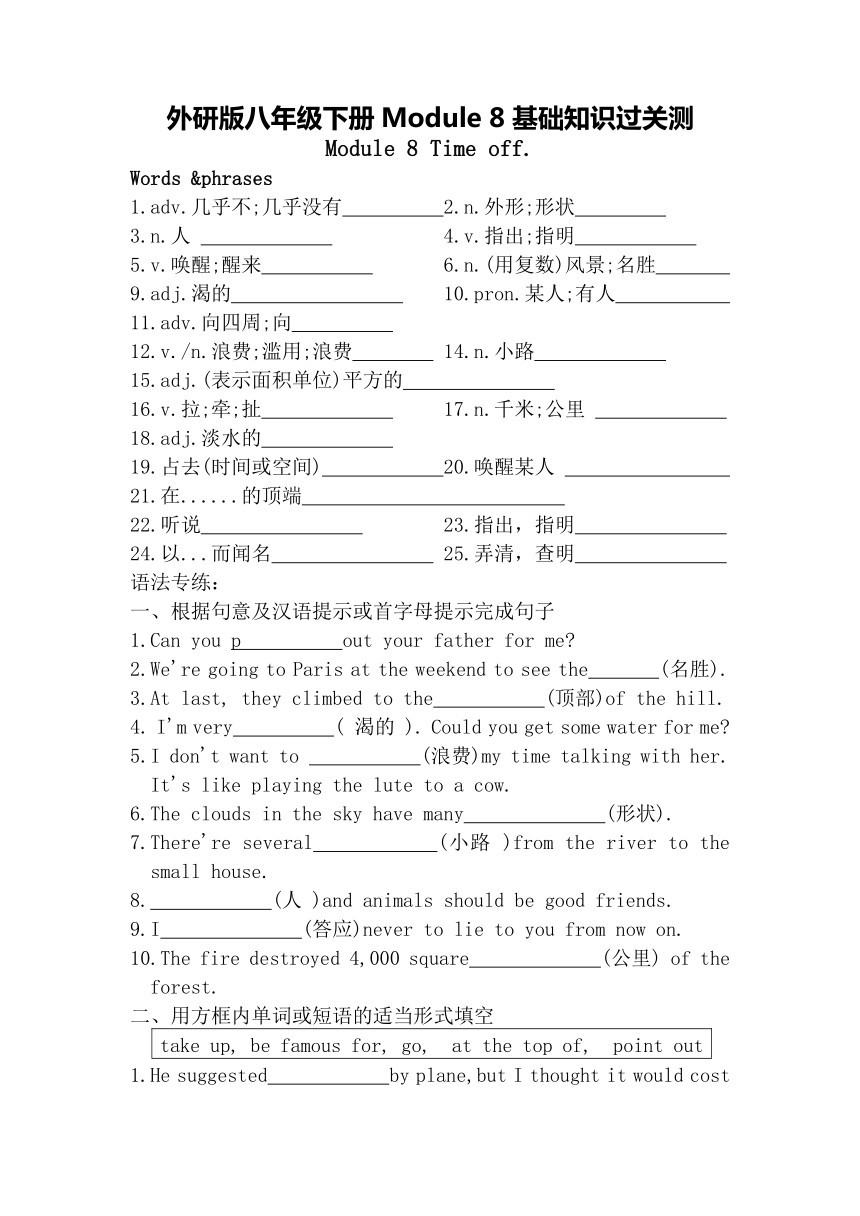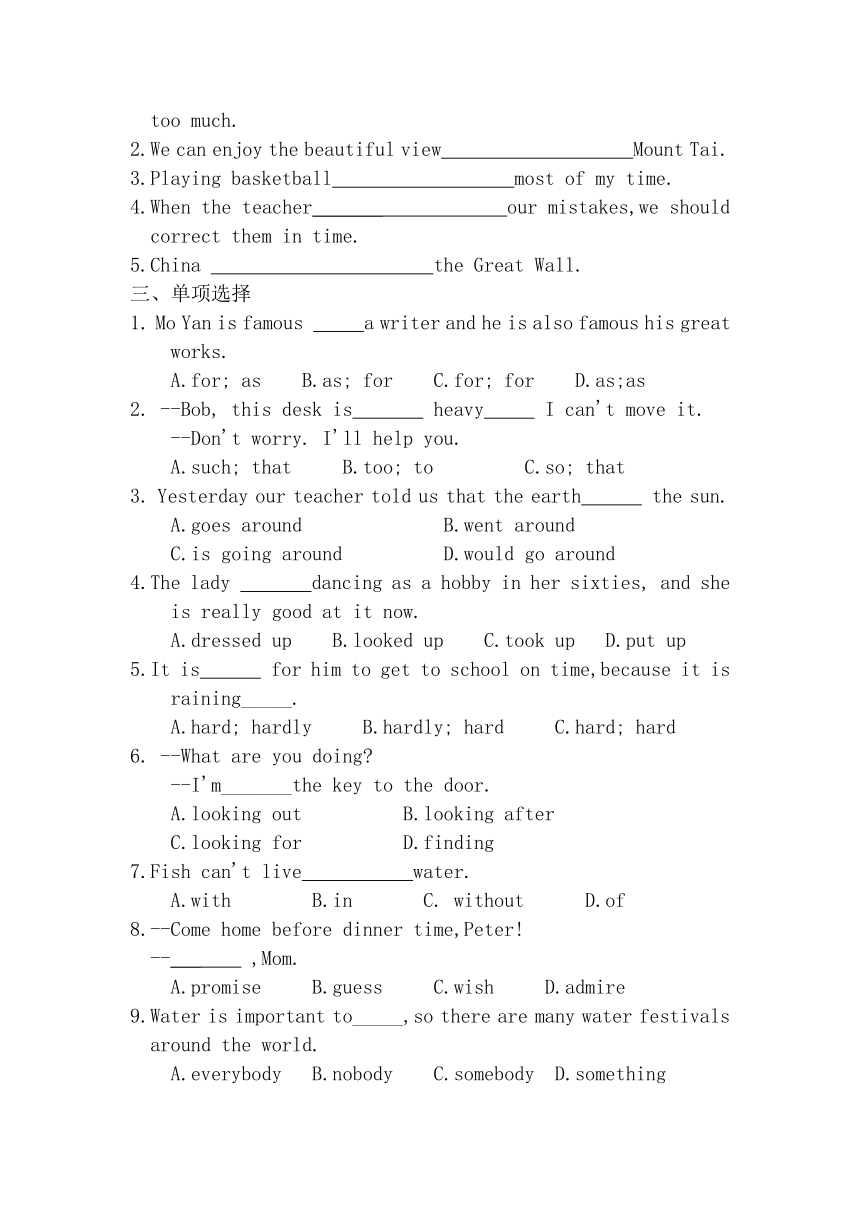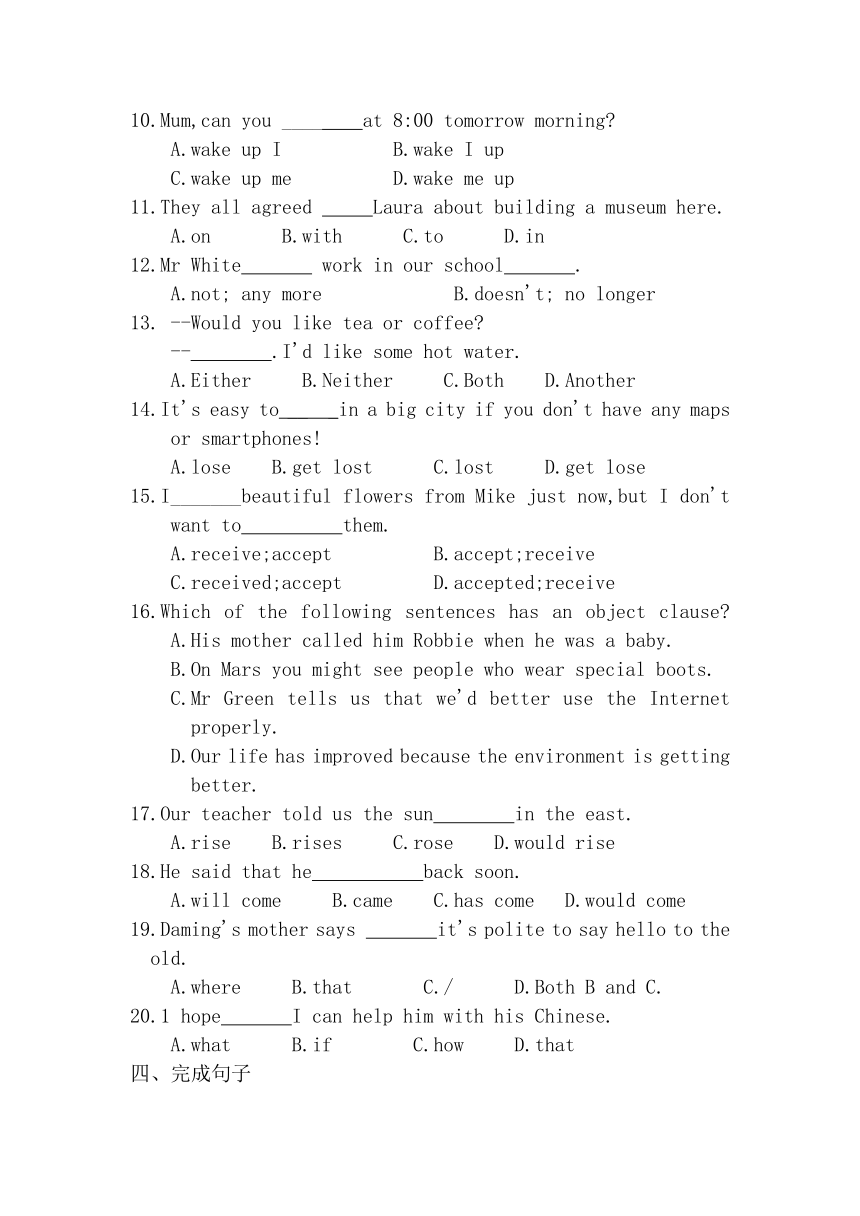Module 8 Time off基础知识过关测(含答案)2024-2025学年外研版英语八年级下册
文档属性
| 名称 | Module 8 Time off基础知识过关测(含答案)2024-2025学年外研版英语八年级下册 |  | |
| 格式 | docx | ||
| 文件大小 | 25.3KB | ||
| 资源类型 | 教案 | ||
| 版本资源 | 外研版 | ||
| 科目 | 英语 | ||
| 更新时间 | 2024-10-27 14:03:55 | ||
图片预览



文档简介
外研版八年级下册Module 8基础知识过关测
Module 8 Time off.
Words &phrases
1.adv.几乎不;几乎没有 2.n.外形;形状
3.n.人 4.v.指出;指明
5.v.唤醒;醒来 6.n.(用复数)风景;名胜
9.adj.渴的 10.pron.某人;有人
11.adv.向四周;向
12.v./n.浪费;滥用;浪费 14.n.小路
15.adj.(表示面积单位)平方的
16.v.拉;牵;扯 17.n.千米;公里
18.adj.淡水的
19.占去(时间或空间) 20.唤醒某人
21.在......的顶端
22.听说 23.指出,指明
24.以...而闻名 25.弄清,查明
语法专练:
一、根据句意及汉语提示或首字母提示完成句子
1.Can you p out your father for me
2.We're going to Paris at the weekend to see the (名胜).
3.At last, they climbed to the (顶部)of the hill.
4. I'm very ( 渴的 ). Could you get some water for me
5.I don't want to (浪费)my time talking with her. It's like playing the lute to a cow.
6.The clouds in the sky have many (形状).
7.There're several (小路 )from the river to the small house.
8. (人 )and animals should be good friends.
9.I (答应)never to lie to you from now on.
10.The fire destroyed 4,000 square (公里) of the forest.
二、用方框内单词或短语的适当形式填空
take up, be famous for, go, at the top of, point out
1.He suggested by plane,but I thought it would cost too much.
2.We can enjoy the beautiful view Mount Tai.
3.Playing basketball most of my time.
4.When the teacher_______ our mistakes,we should correct them in time.
5.China the Great Wall.
三、单项选择
1. Mo Yan is famous a writer and he is also famous his great works.
A.for; as B.as; for C.for; for D.as;as
2. --Bob, this desk is heavy I can't move it.
--Don't worry. I'll help you.
A.such; that B.too; to C.so; that
3. Yesterday our teacher told us that the earth the sun.
A.goes around B.went around
C.is going around D.would go around
4.The lady dancing as a hobby in her sixties, and she is really good at it now.
A.dressed up B.looked up C.took up D.put up
5.It is for him to get to school on time,because it is raining_____.
A.hard; hardly B.hardly; hard C.hard; hard
6. --What are you doing
--I'm_______the key to the door.
A.looking out B.looking after
C.looking for D.finding
7.Fish can't live water.
A.with B.in C. without D.of
8.--Come home before dinner time,Peter!
--___ ,Mom.
A.promise B.guess C.wish D.admire
9.Water is important to_____,so there are many water festivals around the world.
A.everybody B.nobody C.somebody D.something
10.Mum,can you ____ at 8:00 tomorrow morning
A.wake up I B.wake I up
C.wake up me D.wake me up
11.They all agreed Laura about building a museum here.
A.on B.with C.to D.in
12.Mr White work in our school .
A.not; any more B.doesn't; no longer
13. --Would you like tea or coffee
-- .I'd like some hot water.
A.Either B.Neither C.Both D.Another
14.It's easy to __ _in a big city if you don't have any maps or smartphones!
A.lose B.get lost C.lost D.get lose
15.I_______beautiful flowers from Mike just now,but I don't want to them.
A.receive;accept B.accept;receive
C.received;accept D.accepted;receive
16.Which of the following sentences has an object clause A.His mother called him Robbie when he was a baby.
B.On Mars you might see people who wear special boots.
C.Mr Green tells us that we'd better use the Internet properly.
D.Our life has improved because the environment is getting better.
17.Our teacher told us the sun in the east.
A.rise B.rises C.rose D.would rise
18.He said that he back soon.
A.will come B.came C.has come D.would come
19.Daming's mother says it's polite to say hello to the old.
A.where B.that C./ D.Both B and C.
20.1 hope I can help him with his Chinese.
A.what B.if C.how D.that
四、完成句子
1.欢迎来到北京。
Beijing.
2.我几乎不可能一天内完成这项工作。
I can the work in a day.
3.这张桌子太占地方。
This table too much room.
4.如果你看到那个男孩,请把他指给我看。
If you see that boy, please for me.
5.我父母不允许我晚回来。
My parents won't me back late.
当你在森林里迷路的时候不要到处走来走去。
Don't when you are lost in the forest.
7.我们不应该从树上拽叶子。
We shouldn't the leaves the trees.
8.大家都说(这对)双胞胎看上去像他们的爸爸。
Everyone says that the twins their father.
9.你不付房租就不能住在这里。
You cannot live here the rent.
10.黄河是中国第二长河。
The Yellow River is river in China.
五、用所给单词的适当形式填空
1.She says that she (be) in this school for five years.
2.I asked him if he______ (come) tomorrow.
3.The boy promises (study) hard at English from now on.
4.Betty left without (say) a word.
5.I was doing my homework while my mother (clean)the room.
六、模块知识浓缩
thirsty, kilometre, wake, look, walk, hardly, bright, scenery, point
One Sunday morning my mother us up and made me take my little brother to a trip to the country.It is five
from my home.I could believe my ears because he was only two years old.And she asked me after him well.It was too hard for me to protect him.
While we along the road, the sun shone and the breeze blew gently. I at the beautiful flowers
and they smiled at us.Then we heard the birds singing in the
trees.The was indeed very beautiful.
When we felt and hungry, we returned home.We saw our mother waiting for us at the door.
以下是对上述内容的详细解析: **Words & Phrases** 这部分是本模块的重点单词和短语,需要理解其含义和用法,例如“hardly”(几乎不)、“take up”(占据)、“wake sb. up”(叫醒某人)等。 **语法专练** **一、根据句意及汉语提示或首字母提示完成句子** 1. “point”,“point out”表示“指出”。 2. “sights”,“名胜”常用“sights”。 3. “top”,“the top of”表示“......的顶部”。 4. “thirsty”,“渴的”。 5. “waste”,“waste time”表示“浪费时间”。 6. “shapes”,“many”后接名词复数,“shape”的复数是“shapes”。 7. “paths”,“several”后接名词复数,“path”的复数是“paths”。 8. “People”,“People”表示“人,人们”。 9. “promise”,“promise to do sth.”表示“承诺做某事”。 10. “kilometres”,“square kilometre”表示“平方公里”,“4,000”后接复数。 **二、用方框内单词或短语的适当形式填空** 1. “going”,“suggest doing sth.”表示“建议做某事”。 2. “at the top of”,“在......顶部”。 3. “takes up”,“Playing basketball”作主语,谓语动词用单数,“take up”表示“占据”。 4. “points out”,“point out”表示“指出”,主语是“the teacher”,用第三人称单数。 5. “is famous for”,“be famous for”表示“因......而闻名”。 **三、单项选择** 1. B:“be famous as + 职业”表示“作为......而出名”;“be famous for + 事物”表示“因......而出名”。 2. C:“so...that...”表示“如此......以至于......”,“so”后接形容词“heavy”。 3. A:“the earth goes around the sun”是客观真理,用一般现在时。 4. C:“take up”表示“开始从事”。 5. C:“hard”作形容词表示“困难的”,作副词表示“猛烈地”;“hardly”表示“几乎不”。 6. C:“look for”表示“寻找”。 7. C:“without”表示“没有”。 8. A:“promise”表示“承诺”。 9. A:“everybody”表示“每个人”。 10. D:“wake sb. up”表示“叫醒某人”,代词放中间。 11. B:“agree with sb.”表示“同意某人”。 12. A:“not...any more”表示“不再”。 13. B:“Neither”表示“两者都不”。 14. B:“get lost”表示“迷路”。 15. C:“receive”表示“收到”,“accept”表示“接受”。 16. C:“that we'd better use the Internet properly”是宾语从句。 17. B:“the sun rises in the east”是客观真理,用一般现在时。 18. D:“said”是过去时,宾语从句用过去将来时。 19. D:“that”引导宾语从句可省略。 20. D:“hope that...”表示“希望......”。 **四、完成句子** 1. “Welcome to”,“Welcome to + 地点”表示“欢迎来到......”。 2. “hardly finish”,“hardly”表示“几乎不”,“finish”表示“完成”。 3. “takes up”,“take up”表示“占据”,主语是“table”,用第三人称单数。 4. “point him out”,“point out”表示“指出”,“him”作宾语。 5. “allow; to come”,“allow sb. to do sth.”表示“允许某人做某事”。 6. “walk around”,“walk around”表示“到处走”。 7. “pull; from”,“pull...from...”表示“从......拽......”。 8. “look like”,“look like”表示“看起来像”。 9. “without paying”,“without”表示“没有”,“paying”是“pay”的动名词形式。 10. “the second longest”,“the + 序数词 + 形容词最高级”表示“第几最......”。 **五、用所给单词的适当形式填空** 1. “has been”,“for five years”是时间段,用现在完成时,主语是“she”,用“has been”。 2. “would come”,“asked”是过去时,宾语从句用过去将来时。 3. “to study”,“promise to do sth.”表示“承诺做某事”。 4. “saying”,“without”是介词,后接动名词。 5. “was cleaning”,“while”引导的时间状语从句,主句用过去进行时,从句用一般过去时。 **六、模块知识浓缩** 这段短文主要描述了一次出行经历。“woke”,“wake sb. up”表示“叫醒某人”;“kilometres”,“five kilometres”表示“五公里”;“hardly”,“could hardly believe”表示“几乎不能相信”;“look”,“look after”表示“照顾”;“walked”,“walk along”表示“沿着......走”;“brightly”,形容阳光照耀得明亮;“pointed”,“point at”表示“指向”;“scenery”,“the scenery”表示“风景”;“thirsty”,“感到口渴”。
Module 8 Time off.
Words &phrases
1.adv.几乎不;几乎没有 2.n.外形;形状
3.n.人 4.v.指出;指明
5.v.唤醒;醒来 6.n.(用复数)风景;名胜
9.adj.渴的 10.pron.某人;有人
11.adv.向四周;向
12.v./n.浪费;滥用;浪费 14.n.小路
15.adj.(表示面积单位)平方的
16.v.拉;牵;扯 17.n.千米;公里
18.adj.淡水的
19.占去(时间或空间) 20.唤醒某人
21.在......的顶端
22.听说 23.指出,指明
24.以...而闻名 25.弄清,查明
语法专练:
一、根据句意及汉语提示或首字母提示完成句子
1.Can you p out your father for me
2.We're going to Paris at the weekend to see the (名胜).
3.At last, they climbed to the (顶部)of the hill.
4. I'm very ( 渴的 ). Could you get some water for me
5.I don't want to (浪费)my time talking with her. It's like playing the lute to a cow.
6.The clouds in the sky have many (形状).
7.There're several (小路 )from the river to the small house.
8. (人 )and animals should be good friends.
9.I (答应)never to lie to you from now on.
10.The fire destroyed 4,000 square (公里) of the forest.
二、用方框内单词或短语的适当形式填空
take up, be famous for, go, at the top of, point out
1.He suggested by plane,but I thought it would cost too much.
2.We can enjoy the beautiful view Mount Tai.
3.Playing basketball most of my time.
4.When the teacher_______ our mistakes,we should correct them in time.
5.China the Great Wall.
三、单项选择
1. Mo Yan is famous a writer and he is also famous his great works.
A.for; as B.as; for C.for; for D.as;as
2. --Bob, this desk is heavy I can't move it.
--Don't worry. I'll help you.
A.such; that B.too; to C.so; that
3. Yesterday our teacher told us that the earth the sun.
A.goes around B.went around
C.is going around D.would go around
4.The lady dancing as a hobby in her sixties, and she is really good at it now.
A.dressed up B.looked up C.took up D.put up
5.It is for him to get to school on time,because it is raining_____.
A.hard; hardly B.hardly; hard C.hard; hard
6. --What are you doing
--I'm_______the key to the door.
A.looking out B.looking after
C.looking for D.finding
7.Fish can't live water.
A.with B.in C. without D.of
8.--Come home before dinner time,Peter!
--___ ,Mom.
A.promise B.guess C.wish D.admire
9.Water is important to_____,so there are many water festivals around the world.
A.everybody B.nobody C.somebody D.something
10.Mum,can you ____ at 8:00 tomorrow morning
A.wake up I B.wake I up
C.wake up me D.wake me up
11.They all agreed Laura about building a museum here.
A.on B.with C.to D.in
12.Mr White work in our school .
A.not; any more B.doesn't; no longer
13. --Would you like tea or coffee
-- .I'd like some hot water.
A.Either B.Neither C.Both D.Another
14.It's easy to __ _in a big city if you don't have any maps or smartphones!
A.lose B.get lost C.lost D.get lose
15.I_______beautiful flowers from Mike just now,but I don't want to them.
A.receive;accept B.accept;receive
C.received;accept D.accepted;receive
16.Which of the following sentences has an object clause A.His mother called him Robbie when he was a baby.
B.On Mars you might see people who wear special boots.
C.Mr Green tells us that we'd better use the Internet properly.
D.Our life has improved because the environment is getting better.
17.Our teacher told us the sun in the east.
A.rise B.rises C.rose D.would rise
18.He said that he back soon.
A.will come B.came C.has come D.would come
19.Daming's mother says it's polite to say hello to the old.
A.where B.that C./ D.Both B and C.
20.1 hope I can help him with his Chinese.
A.what B.if C.how D.that
四、完成句子
1.欢迎来到北京。
Beijing.
2.我几乎不可能一天内完成这项工作。
I can the work in a day.
3.这张桌子太占地方。
This table too much room.
4.如果你看到那个男孩,请把他指给我看。
If you see that boy, please for me.
5.我父母不允许我晚回来。
My parents won't me back late.
当你在森林里迷路的时候不要到处走来走去。
Don't when you are lost in the forest.
7.我们不应该从树上拽叶子。
We shouldn't the leaves the trees.
8.大家都说(这对)双胞胎看上去像他们的爸爸。
Everyone says that the twins their father.
9.你不付房租就不能住在这里。
You cannot live here the rent.
10.黄河是中国第二长河。
The Yellow River is river in China.
五、用所给单词的适当形式填空
1.She says that she (be) in this school for five years.
2.I asked him if he______ (come) tomorrow.
3.The boy promises (study) hard at English from now on.
4.Betty left without (say) a word.
5.I was doing my homework while my mother (clean)the room.
六、模块知识浓缩
thirsty, kilometre, wake, look, walk, hardly, bright, scenery, point
One Sunday morning my mother us up and made me take my little brother to a trip to the country.It is five
from my home.I could believe my ears because he was only two years old.And she asked me after him well.It was too hard for me to protect him.
While we along the road, the sun shone and the breeze blew gently. I at the beautiful flowers
and they smiled at us.Then we heard the birds singing in the
trees.The was indeed very beautiful.
When we felt and hungry, we returned home.We saw our mother waiting for us at the door.
以下是对上述内容的详细解析: **Words & Phrases** 这部分是本模块的重点单词和短语,需要理解其含义和用法,例如“hardly”(几乎不)、“take up”(占据)、“wake sb. up”(叫醒某人)等。 **语法专练** **一、根据句意及汉语提示或首字母提示完成句子** 1. “point”,“point out”表示“指出”。 2. “sights”,“名胜”常用“sights”。 3. “top”,“the top of”表示“......的顶部”。 4. “thirsty”,“渴的”。 5. “waste”,“waste time”表示“浪费时间”。 6. “shapes”,“many”后接名词复数,“shape”的复数是“shapes”。 7. “paths”,“several”后接名词复数,“path”的复数是“paths”。 8. “People”,“People”表示“人,人们”。 9. “promise”,“promise to do sth.”表示“承诺做某事”。 10. “kilometres”,“square kilometre”表示“平方公里”,“4,000”后接复数。 **二、用方框内单词或短语的适当形式填空** 1. “going”,“suggest doing sth.”表示“建议做某事”。 2. “at the top of”,“在......顶部”。 3. “takes up”,“Playing basketball”作主语,谓语动词用单数,“take up”表示“占据”。 4. “points out”,“point out”表示“指出”,主语是“the teacher”,用第三人称单数。 5. “is famous for”,“be famous for”表示“因......而闻名”。 **三、单项选择** 1. B:“be famous as + 职业”表示“作为......而出名”;“be famous for + 事物”表示“因......而出名”。 2. C:“so...that...”表示“如此......以至于......”,“so”后接形容词“heavy”。 3. A:“the earth goes around the sun”是客观真理,用一般现在时。 4. C:“take up”表示“开始从事”。 5. C:“hard”作形容词表示“困难的”,作副词表示“猛烈地”;“hardly”表示“几乎不”。 6. C:“look for”表示“寻找”。 7. C:“without”表示“没有”。 8. A:“promise”表示“承诺”。 9. A:“everybody”表示“每个人”。 10. D:“wake sb. up”表示“叫醒某人”,代词放中间。 11. B:“agree with sb.”表示“同意某人”。 12. A:“not...any more”表示“不再”。 13. B:“Neither”表示“两者都不”。 14. B:“get lost”表示“迷路”。 15. C:“receive”表示“收到”,“accept”表示“接受”。 16. C:“that we'd better use the Internet properly”是宾语从句。 17. B:“the sun rises in the east”是客观真理,用一般现在时。 18. D:“said”是过去时,宾语从句用过去将来时。 19. D:“that”引导宾语从句可省略。 20. D:“hope that...”表示“希望......”。 **四、完成句子** 1. “Welcome to”,“Welcome to + 地点”表示“欢迎来到......”。 2. “hardly finish”,“hardly”表示“几乎不”,“finish”表示“完成”。 3. “takes up”,“take up”表示“占据”,主语是“table”,用第三人称单数。 4. “point him out”,“point out”表示“指出”,“him”作宾语。 5. “allow; to come”,“allow sb. to do sth.”表示“允许某人做某事”。 6. “walk around”,“walk around”表示“到处走”。 7. “pull; from”,“pull...from...”表示“从......拽......”。 8. “look like”,“look like”表示“看起来像”。 9. “without paying”,“without”表示“没有”,“paying”是“pay”的动名词形式。 10. “the second longest”,“the + 序数词 + 形容词最高级”表示“第几最......”。 **五、用所给单词的适当形式填空** 1. “has been”,“for five years”是时间段,用现在完成时,主语是“she”,用“has been”。 2. “would come”,“asked”是过去时,宾语从句用过去将来时。 3. “to study”,“promise to do sth.”表示“承诺做某事”。 4. “saying”,“without”是介词,后接动名词。 5. “was cleaning”,“while”引导的时间状语从句,主句用过去进行时,从句用一般过去时。 **六、模块知识浓缩** 这段短文主要描述了一次出行经历。“woke”,“wake sb. up”表示“叫醒某人”;“kilometres”,“five kilometres”表示“五公里”;“hardly”,“could hardly believe”表示“几乎不能相信”;“look”,“look after”表示“照顾”;“walked”,“walk along”表示“沿着......走”;“brightly”,形容阳光照耀得明亮;“pointed”,“point at”表示“指向”;“scenery”,“the scenery”表示“风景”;“thirsty”,“感到口渴”。
同课章节目录
- Module 1 Feelings and impressions
- Unit 1 It smells delicious.
- Unit 2 I feel nervous when I speak Chinese .
- Unit 3 Language in use
- Module 2 Experiences
- Unit 1 I've also entered lots of speaking competi
- Unit 2 They have seen the Pyramids.
- Unit 3 Language in use
- Module 3 Journey to space
- Unit 1 Has it arrived yet?
- Unit 2 We have not found life on any other planet
- Unit 3 Language in use
- Module 4 Seeing the docto
- Unit 1 I haven't done much exercise since I got m
- Unit 2 We have played football for a year now
- Unit 3 Language in use
- Module 5 Cartoons
- Unit 1 It's time to watch a cartoon.
- Unit 2 Tintin has been popular for over eighty yea
- Unit 3 Language in use
- Revision module A
- Module 6 Hobbies
- Unit 1 Do you collect anything ?
- Unit 2 Hobbies can make you grow as a person.
- Unit 3 Language in use
- Module 7 Summer in Los Angeles
- Unit 1 Please write to me and send me some photos
- Unit 2 Fill out a form and come to learn English
- Unit 3 Language in use
- Module 8 Time off
- Unit 1 I can hardly believe we are in the city ce
- Unit 2 We thought somebody was moving about
- Unit 3 Language in use
- Module 9 Friendship
- Unit 1 Could I ask if you've mentioned this to he
- Unit 2 I believe that the world is what you think
- Unit 3 Language in use
- Module 10 On the radio
- Unit 1 I hope that you can join us one day
- Unit 2 It seemed that they were speaking to me in
- Unit 3 Language in use
- Revision module B
